After traveling over 7,900 miles on March 15th, a group of students and mentors walked out into the warm night air, standing just outside the Jomo Kenyatta International Airport in Nairobi, Kenya. The group was Engineers Without Borders from Hope College (EWB-Hope). The team of 5 students, Chris Rexroth, Annie Dankovich, Matthew Dickerson, Krista Nelson, and myself, Graham Gould, accompanied by mentors Adam Peckens and Dale Nowicki, were headed to Bondo, Kenya to monitor and assess the water systems that were installed in the community. In 2017, EWB-Hope worked with the community of approximately 500 people to install two wells and a rainwater catchment system. Prior to Hope EWB-Hope’s involvement, there had been no clean water source within the community boundaries.
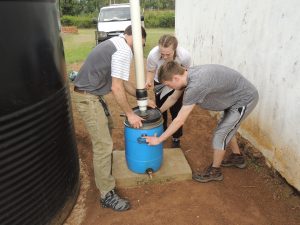
This year’s trip focused on monitoring and assessing to ensure the upkeep of the current systems, as well as determining the feasibility of installing another well. The first order of business was the opening meeting, during which the overall trip goals and happenings in the past year were discussed. The next few days were spent inspecting the water systems by checking if all of the components still worked properly and operated smoothly.
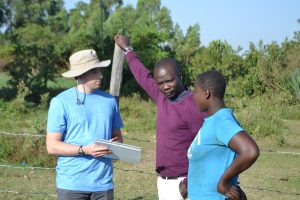
Water quality testing was also completed to ensure the water being provided was actually clean and free of contaminants, such as fecal coliforms. One morning during well hours, (wells are only open for a certain period of time) teams were assigned to each well to conduct surveys of the community members using the wells. The goal of the surveys was to understand water accessibility and water usage. The chapter could finally collect data and see firsthand the changes in the community due to the installed systems.
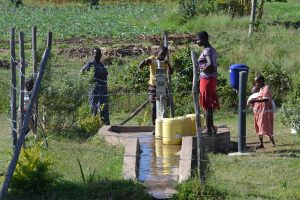
Personally, it was humbling to see a young woman, the same age as me, walk for half an hour one way carrying 3 yellow 20 liter bins to fill for her family’s daily water needs. She would then have to make several trips back and forth to bring all the water home, as one 20 liter can of water was heavy enough for one trip. This made me really consider the ease of access to water that we have in the U.S., which so many of us take for granted, and put into perspective how valuable of a resource this is.
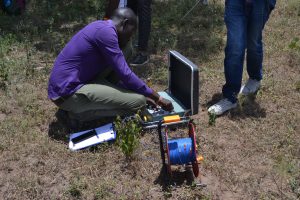
EWB-Hope is also looking at the possibility of installing a third well in the community, in a region that still lacks access to water, termed Bondo C. To properly assess the need, the team mapped potential locations using a GPS and also worked with an in-country hydrogeologist who conducted hydrogeological surveys. These surveys use resistivity to map the ground layers straight down from one point. They can be thought of as a sonar system, as two metal probes connected to a machine send a current from one to the other. The day before the hydrogeologist came, community members showed the team around the Bondo C region to locate possible sites. That evening the team looked at five potential locations and narrowed it down to three based on location relative to other wells and higher population density areas, elevation from sea level, and ease of access for drilling. The data from the surveys at these three locations is now being analyzed by students back at Hope College.
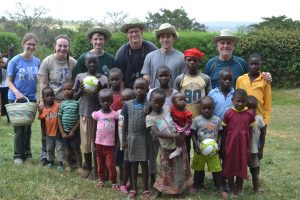
Going on this trip made me realize just how much we take clean water for granted. In the U.S., it is not a big deal to leave the faucet on while doing something else, which wastes so much water. In Bondo, every drop has to be earned by going to wherever clean water can be found, sometimes miles away. While driving through the outer regions of Kenya, we saw people cleaning their clothes, bathing, and gathering water from a cloudy, brown river. There was no sparkly bottom to this river, making us realize just how lucky we really are. Clean water is still very much a valuable resource.
From an engineering standpoint, the trip impacted me as I saw the results of the chapter’s previous and continued hard work in Kenya. Through this experience, I was able to observe firsthand what is only in writing back home and gain a clearer perspective of the situation. To future students considering a trip like this, I would say go! Opportunities like this truly change your view on life.
Author Graham Gould is a freshman engineering student at Hope College. He became involved in EWB during his first semester at college.

